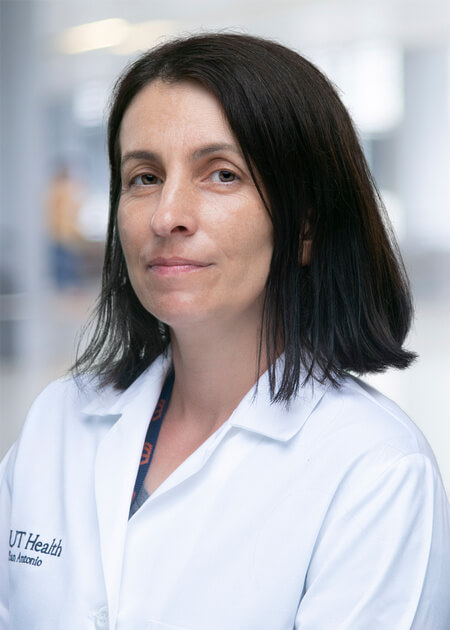The Max and Minnie Tomerlin Voelcker Fund is awarding $1.7 million to UT Health San Antonio to support research projects conducted by promising early career researchers.
The Voelcker Fund’s Young Investigator Awards, which provide each recipient with $150,000 per year over three years ($450,000), are intended to support young scientists conducting biomedical research in the areas of cancer, heart disease, arthritis, muscular dystrophy, retinitis and/or macular degeneration of the retina.
This year’s Voelcker Fund Young Investigator Award recipients at UT Health San Antonio are Crystal Archer, PhD, Masahiro Morita, PhD, Neelam Mukherjee, PhD, and Angelina Vaseva, PhD.

Crystal Archer, PhD, is a postdoctoral fellow in the Department of Cellular and Integrative Physiology. This award will support her project, “Mechanism of Ankyrin G Regulation of the Epithelial Na+ Channel.”
Dr. Archer’s project focuses on the mechanisms that control blood pressure and will study the interactions and conformational changes of purified epithelial Na+ Channel (ENaC) and Ankyrin G (AnkG). Understanding these key interactions and obtaining the novel structures will help to lay the foundation for developing more specific therapeutics targeting ENaC-AnkG interactions for treating and preventing hypertension and heart disease.

Masahiro Morita, PhD, is an assistant professor with joint appointments in the Department of Molecular Medicine and the Sam and Ann Barshop Institute for Longevity and Aging Studies. Dr. Morita’s project is titled, “mRNA Translation and Mitochondrial Dynamics in Obesity-induced Liver Cancer.”
Preliminary findings from Dr. Morita and his research team have led to the hypothesis that overnutrition promotes mRNA translation, as well as mitochondrial fission and activities for energy production, and that dysregulated protein synthesis promotes enlargement and stress to the rough endoplasmic reticulum and chronic inflammation, which is then followed by obesity-induced hepatocellular carcinoma (HCC), a common form of liver cancer. Novel findings from the project will provide new therapeutic strategies against human obesity-associated HCC.

Neelam Mukherjee, PhD, is an instructor and researcher in the Department of Urology. Her project is titled, “Effect of Nitration on CCL2 Mediated Bladder Tumor.”
Her study focuses on the chemokine CCL2 and the signaling mechanisms that drive bladder cancer growth. Preliminary data from her team found recombinant CCL2 (rCCL2) protein administered directly into the bladder to be therapeutic. Their research has also shown that posttranslational nitration of CCL2 by bladder tumors inhibits rCCL2’s ability to recruit T cells and its effects on tumor control. The team developed nitration-resistant rCCL2 (nr-rCCL2) proteins to be tested as novel therapeutic agents for treating bladder cancer. They hypothesize that nr-rCCL2 treats bladder cancer by increasing the recruitment and/or activation of intratumoral bladder T cells. Findings from this project could lead to a new treatment regimen for bladder cancer.

Angelina Vaseva, PhD, is an assistant professor in the Department of Molecular Medicine and the Greehey Children’s Cancer Research Institute. Dr. Vaseva is receiving $350,000 over three years for her award as she received $100,000 last year as a Voelcker Fund Pilot Research Award winner.
Her project is titled, “Utilizing Type 2 RAF inhibitors for the Treatment of NF1-associated MPNST.” The study focuses on the development of novel therapeutic strategies for neurofibromatosis type 1 with malignant peripheral nerve sheath tumor (NF1-associated MPNST), a type of highly aggressive soft-tissue sarcoma and the leading cause of death in NF1 patients. Preliminary data from Dr. Vaseva and her team indicated that both BRAF and CRAF kinases are important for the growth of NF1-MPNST cell lines, and that these cell lines are preferentially more sensitive to type 2 RAF inhibitors. The overall goal of her project is to define directions for novel strategies to treat NF1-MPNST by utilizing type 2 RAF inhibitors.
To date, the Voelcker Fund has provided $27.6 million in grants for medical research in furtherance of its charitable mission to UT Health San Antonio.


